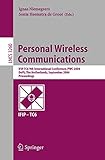Personal Wireless Communications [electronic resource] : IFIP TC6 9th International Conference, PWC 2004, Delft, The Netherlands, September 21-23, 2004. Proceedings / edited by Ignas Niemegeers, Sonia Heemstra Groot.
Material type: TextSeries: Lecture Notes in Computer Science ; 3260Publisher: Berlin, Heidelberg : Springer Berlin Heidelberg, 2004Description: XIV, 482 p. online resourceContent type: text Media type: computer Carrier type: online resourceISBN: 9783540301998Subject(s): Computer science | Computer Communication Networks | Software engineering | Information storage and retrieval systems | Information systems | Computer Science | Computer Communication Networks | Information Systems Applications (incl.Internet) | Information Storage and Retrieval | Software Engineering | Personal ComputingAdditional physical formats: Printed edition:: No titleDDC classification: 004.6 LOC classification: TK5105.5-5105.9Online resources: Click here to access online
TextSeries: Lecture Notes in Computer Science ; 3260Publisher: Berlin, Heidelberg : Springer Berlin Heidelberg, 2004Description: XIV, 482 p. online resourceContent type: text Media type: computer Carrier type: online resourceISBN: 9783540301998Subject(s): Computer science | Computer Communication Networks | Software engineering | Information storage and retrieval systems | Information systems | Computer Science | Computer Communication Networks | Information Systems Applications (incl.Internet) | Information Storage and Retrieval | Software Engineering | Personal ComputingAdditional physical formats: Printed edition:: No titleDDC classification: 004.6 LOC classification: TK5105.5-5105.9Online resources: Click here to access online  E-BOOKS
E-BOOKS
| Current library | Home library | Call number | Materials specified | URL | Status | Date due | Barcode |
|---|---|---|---|---|---|---|---|
| IMSc Library | IMSc Library | Link to resource | Available | EBK3394 |
Self-Organization of Wireless Networks: The New Frontier (Keynote Speech) -- The Impacts of Signaling Time on the Performance of Fast Handovers for MIPv6 -- An Efficient Binding Update Scheme Applied to the Server Mobile Node and Multicast in the MIPv6 -- A Unified Route Optimization Scheme for Network Mobility -- Paging Load Congestion Control in Cellular Mobile Networks -- Opportunistic Scheduling for QoS Guarantees in 3G Wireless Links -- Erlang Capacity Analysis of Multi-access Systems Supporting Voice and Data Services -- Mobility Management in Cellular Communication Systems Using Fuzzy Systems -- Admission Control and Route Discovery for QoS Traffic in Ad Hoc Networks -- Adaptive Multi-mode Routing in Mobile Ad Hoc Networks -- Service Location and Multiparty Peering for Mobile Ad Hoc Communication -- Ad Hoc Routing with Early Unidirectionality Detection and Avoidance -- 802.11 Link Quality and Its Prediction – An Experimental Study -- BER Estimation for HiperLAN/2 -- An Efficient Backoff Scheme for IEEE 802.11 DCF -- Selective Channel Scanning for Fast Handoff in Wireless LAN Using Neighbor Graph -- Throughput Analysis of ETSI BRAN HIPERLAN/2 MAC Protocol Taking Guard Timing Spaces into Consideration -- Reconfigurable Wireless Interface for Networking Sensors (ReWINS) -- Mission-Guided Key Management for Ad Hoc Sensor Network -- Aggregation-Aware Routing on Wireless Sensor Networks -- A Self-Organizing Link Layer Protocol for UWB Ad Hoc Networks -- Quality of Service Support in Wireless Ad Hoc Networks Connected to Fixed DiffServ Domains -- Scheduling of QoS Guaranteed Services in DS-CDMA Uplink Networks: Modified Weighted G-Fair Algorithm -- Receiver-Based Flow Control Mechanism with Interlayer Collaboration for Real-Time Communication Quality in W-CDMA Networks -- Network-Level Simulation Results of Fair Channel-Dependent Scheduling in Enhanced UMTS -- Downlink Scheduling and Resource Management for Best Effort Service in TDD-OFDMA Cellular Networks -- On the Performance of TCP Vegas over UMTS/WCDMA Channels with Large Round-Trip Time Variations -- On the Unsuitability of TCP RTO Estimation over Bursty Error Channels -- Performance Evaluation of Bit Loading, Subcarrier Allocation, and Power Control Algorithms for Cellular OFDMA Systems -- Multicode Multirate Compact Assignment of OVSF Codes for QoS Differentiated Terminals -- Performance Analysis and Receiver Design for SDMA-Based Wireless Networks in Impulsive Noise -- Performance Analysis and Allocation Strategy for the WCDMA Second Scrambling Code -- An Adaptive Localized Scheme for Energy-Efficient Broadcasting in Ad Hoc Networks with Directional Antennas -- An Enhanced Power Save Mode for IEEE 802.11 Station in Ad Hoc Networks -- Achieving “Always Best Connected” Through Extensive Profile Management -- Efficient Role Based Access Control Method in Wireless Environment -- Signaling Load of Hierarchical Mobile IPv6 Protocol in IPv6 Networks -- Low-Latency Non-predictive Handover Scheme in Mobile IPv6 Environments -- A Framework for End-to-End QoS Context Transfer in Mobile IPv6.
The IFIP TC-6 9th International Conference on Personal Wireless Communi- tions, PWC 2004 is the main conference of the IFIP Working Group 6. 8, Mobile and Wireless Communications. The ?eld of personal wireless communications is steadily growing in imp- tance,fromanacademic,industrialandsocietalpointofview. Thedroppingcost of WLAN and short-range technologies such as Bluetooth and Zigbee is causing the proliferation of personal devices and appliances equipped with radio int- faces. Together with the gradual deployment of powerful wireless infrastructure networks, such as 3G cellular systems and WLAN hotspots, the conditions are being created for a?ordable ubiquitous communication involving virtually any artifact. This enables new application areas such as ambient intelligence where a world of devices, sensors and actuators surrounding us use wireless technology to create systems that assist us in an unobtrusive way. It also allows the - velopment of personal and personalized environments that accompany a person whereverheorshegoes. ExamplesarePersonalAreaNetworks(PAN)physically surrounding a person, and personal networks with a potentially global reach. PWC 2004 re?ects these developments, which are happening on a global scale. Researchers from all over the world, and in particular a large number from Asia, made contributions to the conference. There were 100 submissions. After a thorough reviewing process, 25 full papers and 13 short papers were retained for presentation in the technical sessions. The papers cover the whole range of wireless and mobile technologies: cellular systems, WLAN, ad hoc and sensor networks, host and network mobility, transport protocols for wireless systems, and the physical layer.


There are no comments on this title.